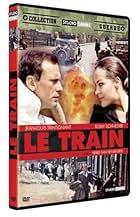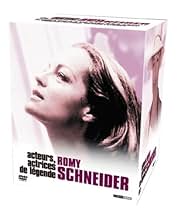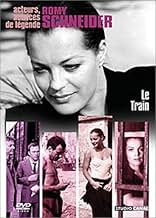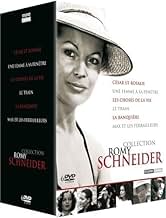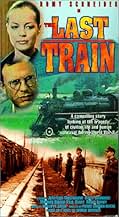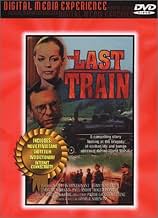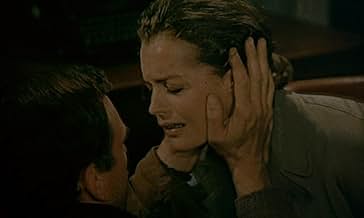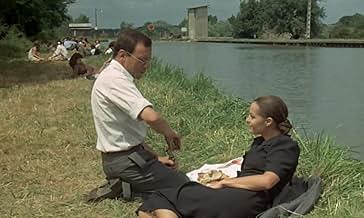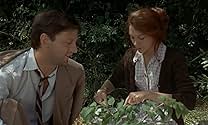CALIFICACIÓN DE IMDb
6.9/10
1.8 k
TU CALIFICACIÓN
Dos personas, el francés Julie Maroyeur, y la judía alemana Anna Kupfer, se conocen en un tren mientras escapan de Alemania para ir a Francia.Dos personas, el francés Julie Maroyeur, y la judía alemana Anna Kupfer, se conocen en un tren mientras escapan de Alemania para ir a Francia.Dos personas, el francés Julie Maroyeur, y la judía alemana Anna Kupfer, se conocen en un tren mientras escapan de Alemania para ir a Francia.
- Dirección
- Guionistas
- Elenco
- Premios
- 1 nominación en total
Opiniones destacadas
... one of Hollywood's favourite blends. Luckily, this is not a Hollywood movie but a french one; luckily, its bitter realism wins over the sweet moving moments in one of the best-acted cinematic love stories ever. Romy Schneider and J.-L. Trintignant give a performance you won't forget even when you have forgotten most details and plot elements of this simple, but convincing film.
two great actors. subtle revelation of each role nuance. a touching beautiful war film. a delicate precise work. and little more. because its virtue is honest courage to present not only a love story in war time but to describe, softly, a tragedy of many people. lost of houses for preserve life. cruelty as manner to survive. need of the other not only as protection but like proof of your existence. a woman. and a man. the waters of sentimental link. strange beauty of Romy Schneider and the drawing of a man out of his universe presented by Jean Louis Trintignant. the silence. the crumbs of words. the silence. and last meeting. as seed for new dimension of life. that is all.
And also the most known French film about the 1940 French exodus, trying to escape from the Nazi invasion. You had EN MAI FAIS CE QU'IL TE PLAIT, back in 2015, also a very good movie, with the same settings. The other strength of this movie, besides the gripping story, is that the director Granier Deferre was only 13 years old at this time and actually lived this tragic period. So, he was the best placed to provide many of accurate details, that would probably not have been shown in another feature. For instance, those women who took advantage of the train stop, in the middle of the country side, to take a pee, in a field. Then a nazi plane arrives and bombards the area. Three seconds later after the smoke has left, we see the two cadavers of the poor women. Or the scene of a man, also taking a pee, standing between wagons, during a train stop ( of course;;;) Some folks have said that you have some lengths in the film, I agree, but in this kind of feature, lengths are sometimes unavoidable. If you had filled this film with plenty of action sequences, would that had been credible? Hell no. A memorable ending that would have made, even a Waffen SS trooper weep. Believe me.
Unusual but not terribly compelling WWII drama almost wholly set aboard a train (transporting French people fleeing from the oncoming Nazi invaders). The film's core is the budding romance between fellow passengers Jean-Louis Trintignant (whose pregnant wife and young daughter are staying in a different compartment and eventually get 'lost' along the way) and Romy Schneider, a German-Jew war widow.
Despite a busy narrative - Trintignant stepping down at every station to ask for the possible whereabouts of his family, Schneider being picked on by a group of loutish passengers in view of her aristocratic airs (meanwhile, an ageing prostitute is all-too-willing to render her services free of charge in such hard times!) and for whom the usually meek Trintignant stands up, a rather underdeveloped subplot involving young single mother Anne Wiazemsky (then still married to Jean-Luc Godard), etc. - the tone of the film is too glum and the treatment too conventional to generate much audience involvement; that said, the interspersing of black-and-white newsreels of similar events from the era was an inspired touch and the scene in which the train comes under aerial attack from the Nazis, leaving numerous victims, is nicely handled (even if the moment when a couple are mown down while relieving themselves in an open field comes off as unintentionally funny!). Besides, the film has other virtues in the pleasant countryside photography of Walter Wottitz (an expert in WWII-based films, among them John Frankenheimer's THE TRAIN [1964] - which was actually filmed in France!) and a lush score from Philippe Sarde.
An interesting moment in the film occurs when Trintignat scoffs at Schneider's recounting of how the Nazis intended to exterminate the Jewish population, which gives credence to the notion that the world only became aware of the full extent of the Holocaust after the war was over. When the train arrives at its destination, Trintignant is re-united with his family (including a new-born son) - but not before having passed off Schneider as his wife to the Gestapo officials! At the end, however, when she's captured as a member of the Resistance they're somehow able to link her back to him and the couple are brought together for questioning...
Despite a busy narrative - Trintignant stepping down at every station to ask for the possible whereabouts of his family, Schneider being picked on by a group of loutish passengers in view of her aristocratic airs (meanwhile, an ageing prostitute is all-too-willing to render her services free of charge in such hard times!) and for whom the usually meek Trintignant stands up, a rather underdeveloped subplot involving young single mother Anne Wiazemsky (then still married to Jean-Luc Godard), etc. - the tone of the film is too glum and the treatment too conventional to generate much audience involvement; that said, the interspersing of black-and-white newsreels of similar events from the era was an inspired touch and the scene in which the train comes under aerial attack from the Nazis, leaving numerous victims, is nicely handled (even if the moment when a couple are mown down while relieving themselves in an open field comes off as unintentionally funny!). Besides, the film has other virtues in the pleasant countryside photography of Walter Wottitz (an expert in WWII-based films, among them John Frankenheimer's THE TRAIN [1964] - which was actually filmed in France!) and a lush score from Philippe Sarde.
An interesting moment in the film occurs when Trintignat scoffs at Schneider's recounting of how the Nazis intended to exterminate the Jewish population, which gives credence to the notion that the world only became aware of the full extent of the Holocaust after the war was over. When the train arrives at its destination, Trintignant is re-united with his family (including a new-born son) - but not before having passed off Schneider as his wife to the Gestapo officials! At the end, however, when she's captured as a member of the Resistance they're somehow able to link her back to him and the couple are brought together for questioning...
The film is developed during the Lightning War(Blitzkrieg) a military tactics inaugurated by Hitler and carry out by such combat commanders as General Guderian, commanding the Panzers troops, in the French campaigns of 1940. The accent was no longer placed on endless columns of soldiers marching a few miles a day. Instead of the static lines Lightning War emphasized mobility and fluidity, destroying thousands of artillery pieces as well as several French infantry divisions.The enemy was slowed down by bombing from the air all his means of communications and transportation, trains, roads and the opposing air force was destroyed on the ground. The German regular infantry , foot soldiers and motor-drawn artillery were committed to mop up resistance and join up with advances forces. The French invasion is well reflected in documentary stuff added into the movie. French people attempt to flee by any means possibles, throwing the fugitives and defenders into hopeless confusion . A radio repairman named Julien(Jean Louis Trintignant ) aboard a train with his pregnant spouse and kid. But he's placed in cattle wagon and his family in passengers cars . There Julien knows Jewish-German woman named Anna(Romy Schneider),and falls in love with her.Furthermore they befriend to remainder passengers(Regina,Serge Marquand, among others).
This is an interesting drama/war developed in a French train during the 40s and based on novel by George Simenon,'Inspector Maigret's author'.It's the feeling story about a doomed love with sweet moments and sad ending with fateful destination. Extraordinaries performances from duo protagonist, as Jean Louis Trintignant as insignificant father of family turned into enamored and Jewish saving, and an enjoyable Romy Schneider as long-suffering Jewish turned into Resistance fighter. Colorful cinematography by Walter Wottitz who also photographed 'The train' by John Frankenheimer. Emotive and atmospheric musical score by Philippe Sarde. The motion picture is well directed by Pierre Granier-Deferre who added extensive documentary footage. Writer and filmmaker Pierre Granier directed to French all-stars, Jean Louis Trintignant, Alain Delon but specially worked with Jean Gabin and Lino Ventura ; and again directed to Romy Schneider in 'A woman at her window' . Rating : Better than average.
This is an interesting drama/war developed in a French train during the 40s and based on novel by George Simenon,'Inspector Maigret's author'.It's the feeling story about a doomed love with sweet moments and sad ending with fateful destination. Extraordinaries performances from duo protagonist, as Jean Louis Trintignant as insignificant father of family turned into enamored and Jewish saving, and an enjoyable Romy Schneider as long-suffering Jewish turned into Resistance fighter. Colorful cinematography by Walter Wottitz who also photographed 'The train' by John Frankenheimer. Emotive and atmospheric musical score by Philippe Sarde. The motion picture is well directed by Pierre Granier-Deferre who added extensive documentary footage. Writer and filmmaker Pierre Granier directed to French all-stars, Jean Louis Trintignant, Alain Delon but specially worked with Jean Gabin and Lino Ventura ; and again directed to Romy Schneider in 'A woman at her window' . Rating : Better than average.
¿Sabías que…?
- TriviaAs Granier-Deferre had been part of the Exodus (at the age of 13), he was able to add a lot of personal observations to his description of the flight (such as people remaining cheerful despite the tragedy of the situation, nuns picking flowers in a field during a bombing raid, ...)
- ConexionesFeatured in Romy, femme libre (2022)
- Bandas sonorasL'Attaque
Written and Performed by Philippe Sarde Et Orchestre
Selecciones populares
Inicia sesión para calificar y agrega a la lista de videos para obtener recomendaciones personalizadas
- How long is The Last Train?Con tecnología de Alexa
Detalles
- Fecha de lanzamiento
- Países de origen
- Idioma
- También se conoce como
- The Last Train
- Locaciones de filmación
- Saincaize-Meauce, Nièvre, Francia(mined railroad bridge)
- Productoras
- Ver más créditos de la compañía en IMDbPro
- Tiempo de ejecución1 hora 35 minutos
- Color
- Mezcla de sonido
- Relación de aspecto
- 1.66 : 1
Contribuir a esta página
Sugiere una edición o agrega el contenido que falta

Principales brechas de datos
By what name was Le train (1973) officially released in Canada in English?
Responda
